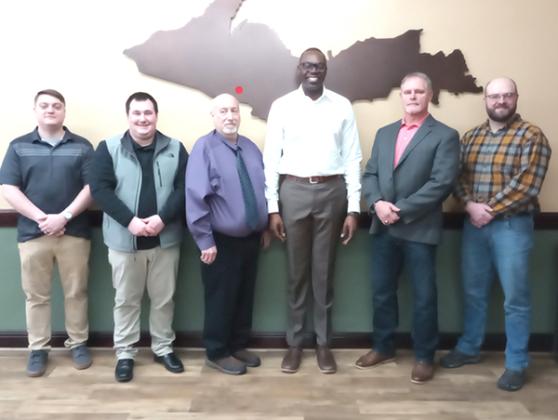Lt. Governor Garlin Gilchrist II visited Crystal Falls on Feb. 14 to discuss affordable housing, as part of a press tour of the U.P. Pictured from left: Travis Cudnohufsky (Crystal Falls city councilor), Zach Hautala (Director of the Iron County Economic Chamber Alliance), Mike McCarthy (Mayor), Lt. Governor Gilchrist, Gerard Valesano (City Manager) and Nathan Kudwa (City Councilor).
By Quinn Illi
CRYSTAL FALLS – On Valentine’s Day morning, Lt. Governor Garlin Gilchrist II hosted a press event in Crystal Falls, to speak on affordable housing — alongside Zach Hautala, the director of the Iron County Economic Chamber Alliance, Mayor Mike McCarthy and City Manager Gerard Valesano, among others.
“[Affordable housing] is an anchor,” Gilchrist said. “. . It’s your starting point for participation in the community. It’s an economic driver. No matter what county or community I go to in Michigan, housing is at the top of everyone’s mind. It’s an issue everywhere, not necessarily the same in every community but it is equally important in every community. I think the key to a community thriving is people knowing they can live there with confidence.”
Gilchrest’s visit comes on the heels of Gov. Gretchen Whitmer announcing plans last month to set aside almost $1.4 billion in state funding to build or rehabilitate homes. That money equates to 10,000 homes, according to the Governor’s Office.
“The most asked question here at City Hall … is ‘Do you have any property to build? Do you have any homes available for sale? Any apartment facilities?’ And we don’t,” said City Manager Gerard Valesano. “I think of the young professionals in teaching, engineering and [the] medical fields. We have those facilities here in our county but we don’t have a place for those [employees] to live.”
Rob Possanza, the administrator of the Iron County Medical Care Facility, said he is forced to limit capacity to 120 beds despite having 200 available, due to staffing shortages. Possanza added that the reason that he has not been able to get employees is due to the lack of housing available for them.
This, however, is soon to change as S.C. Swiderski has made plans with the city and purchased land to build an apartment complex of 68 units comprising a mix of one-, two-, and three-bedroom apartments by the end of 2026.
Marty Fittante is the CEO of InvestUP, an organization that drives economic development. He said that over the last 50 years, Iron County has lost 65% of its K-12 population and over the last 20 years, Iron County has lost 45%.
“When you look at what’s going on with the loss of students and young people and you look at what’s going on with the aging of our population, we have to figure out strategies that turn that around,” Fittante said. “Housing is absolutely the foundation for that.”
Fittante does give cause for optimism by pointing to Census Data showing Iron County has reversed the population decline over the past two years.
“We [at InvestUP] are tracking over $750 million of investment in the Upper Peninsula right now that we think is either reasonably certain to go or is already going [to places like] Billerud in Escanaba. . . and Copperwood in the West,” said Fittante, “I cannot thank the Governor enough for her leadership to make that project happen.”
Recently, InvestUP was awarded a grant of $15 million that they used to create a new nonprofit organization, BuildUP, that assists the U.P. aid both developers and local governments in creating more affordable housing. The organization offers a cash collateral program to help developers more easily begin projects, as well as assistance with the development of infrastructure in ways like covering legal fees and selling bonds, among other things. Crystal Falls plans to take advantage of this organization by applying for a 15 year loan of up to $1.5 million with a 2% interest rate.
“Our number one barrier [to economic growth] is housing,” Hautala, of the ICECA, said. “Once we get the necessary housing that we need, the other things behind it like filling those job vacancies and drawing more people. . . to our area will increase with it.”


